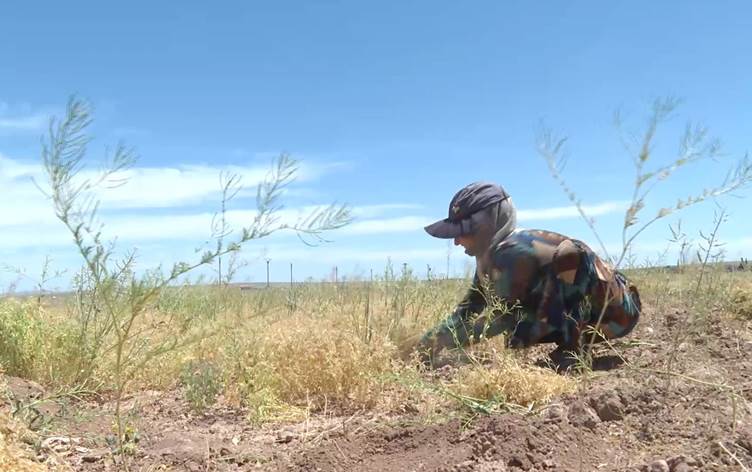A farmer in the Kurdish canton of Kobani in northern Syria, May 2021 (Rudaw)
Syria is facing another wheat crisis, this time in the Kurdish-controlled northeast.
The Kurdish authority estimates that the harvest will be 450,000 to 500,000 tons this year, down from 850,000 tons in 2020 and 800,000 tons in 2019. It cites a lengthy drought, exacerbated by tension with Turkey and water supply issues.
The reduction accompanies food shortages in regime-held areas, with a 222% annual increase in prices. The Assad regime has struggled to fill tenders for imports, as its domestic supply has shrunk. Subsidies on bread have been cut, and loaves are of lower quality.
See also Hunger, Anger, and Fear in Assad’s Syria
The regime’s Agriculture Minister has announced that Syria faces the most severe drought in 70 years, losing more than half of the 1.5 million hectares for wheat cultivation.
There was no significant rainfall until November, late in the season, and precipitation was below average throughout the winter. Crops also suffered from high temperatures this spring.
A Challenge for Syria’s Kurds
Eastern provinces, including the Kurdish areas, have been particularly affected with a threat to about 80% of Syria’s wheat and barley production. Around 70% of the population depend on farming and livestock for a living.
Karim Kraf Abu Muhammad, farming in Raqqa Province, tells Lyse Mauvais of Syria Direct, “I expect this year’s harvest to be around a third of that of the previous year.”
The drought has been compounded by the dispute between Syrian Kurdistan and Turkey over water.
Earlier this month, the level in the key reservoir of al-Assad Lake, in western Raqqa Province, stood at its lowest point since 2013.
The Kurdish authority accuses Turkey of blocking the flow of water into the Euphrates River and the reservoir. Ankara, which considers the leading Syrian Kurdish party PYD and its YPG militia as part of the Turkish Kurdish insurgency PKK, rejects the claim.
The flow of water from Turkey has decreased from 500 cubic meters per second, the rate set in the Protocol for Technical and Economic Cooperation between Syria and Turkey. It is now 200 cubic meters per second, lowering lakes behind the Tishreen, Euphrates and Baath Dams.
See also The Water Crisis in Kurdish-Controlled Northeast Syria
Farmers also blame lack of support from the Kurdish authority in arranging irrigation.
Last week the authority issued a directive more than doubling the price of diesel and petrol. After protests in which at least one person died, the authority withdrew the directive 48 hours later.
In Raqqa Province, Abu Muhammad looked at his parched fields. “Farmers are no longer able to survive,” he says.

